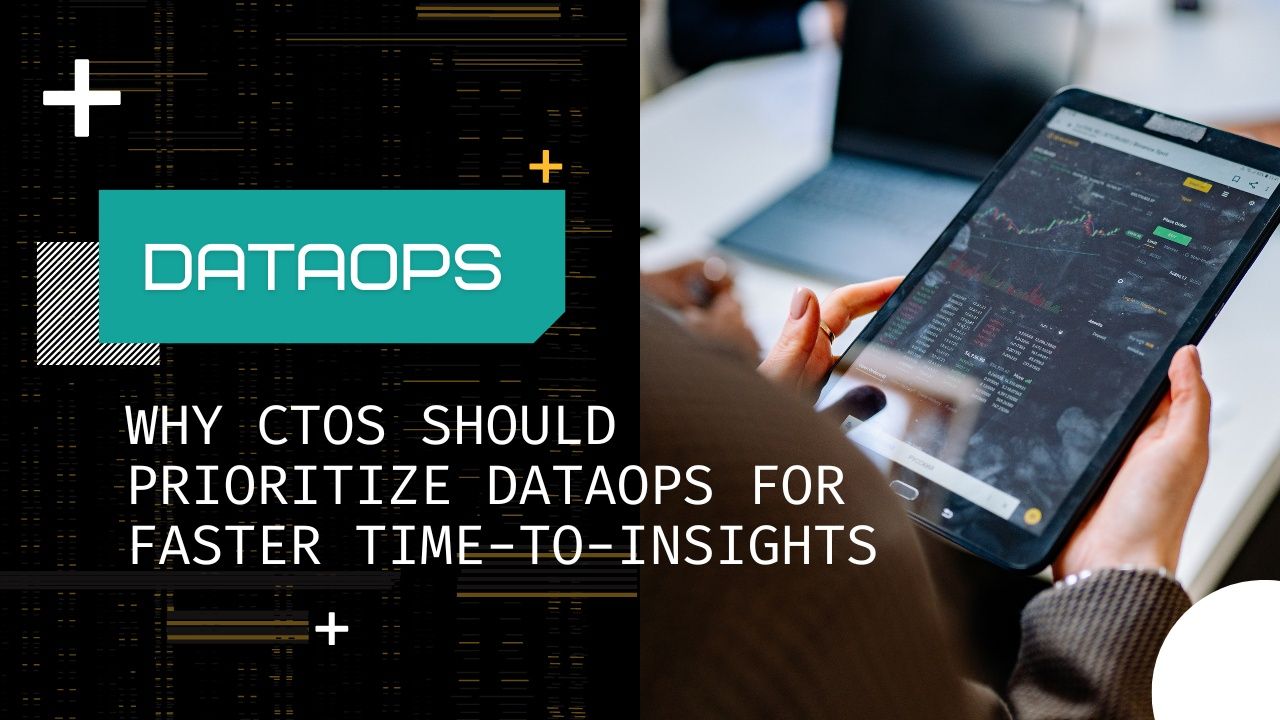In today’s fast-paced business environment, time-to-insights is a critical factor in making informed decisions. Chief Technology Officers (CTOs) need to prioritize the speed and accuracy of data insights in order to stay ahead of the competition. This is where DataOps comes in. DataOps is an approach that streamlines the entire data pipeline, from data ingestion to insights delivery. In this blog post, we will explore why CTOs should prioritize DataOps for faster time-to-insights.
Data Complexity
Enterprise data is becoming increasingly complex, with a growing variety of sources, formats, and structures. This complexity can make it difficult to extract insights in a timely manner. DataOps can help by standardizing data processing and providing automated tools to manage the data pipeline.
With DataOps, CTOs can define standard data formats and processing steps that can be applied consistently across all data sources. This ensures that all data is processed in a standardized manner, reducing errors and ensuring consistent data quality. DataOps can also provide automated tools to manage the data pipeline, reducing the need for manual intervention and enabling faster processing times.
Data Quality
Data quality is critical for accurate insights, but ensuring data quality can be time-consuming and resource-intensive. DataOps provides a framework for automated data quality checks, ensuring that insights are based on reliable data.
With DataOps, CTOs can define automated data quality checks that are applied consistently across all data sources. These checks can include data completeness, data consistency, and data accuracy checks, ensuring that insights are based on high-quality data. Automated data quality checks can also flag data quality issues in real-time, allowing CTOs to quickly identify and resolve data quality issues.
Data Integration
In many organizations, data is siloed across different systems and departments, making it difficult to integrate data for analysis. DataOps can help by providing a unified data pipeline that integrates data from various sources in real-time.
With DataOps, CTOs can define a unified data pipeline that integrates data from various sources in real-time. This allows for faster data integration and enables CTOs to quickly identify patterns and insights across different data sources. A unified data pipeline can also help to break down data silos, enabling data to be shared across different departments and systems.
Speed of Insights
Traditional data pipelines can be slow and cumbersome, leading to delays in insights delivery. DataOps streamlines the pipeline, reducing processing times and enabling faster time-to-insights.
With DataOps, CTOs can define automated data processing steps that are applied consistently across all data sources. This ensures that data is processed quickly and accurately, reducing processing times and enabling faster time-to-insights. DataOps can also provide real-time data processing, enabling CTOs to quickly identify patterns and insights as they emerge.
Continuous Integration and Deployment
DataOps adopts the principles of continuous integration and deployment from software development, allowing for faster and more frequent releases of insights. This helps CTOs to stay agile and respond quickly to changing business needs.
With DataOps, CTOs can adopt the principles of continuous integration and deployment, enabling faster and more frequent releases of insights. This allows CTOs to stay agile and respond quickly to changing business needs, enabling faster time-to-market for new products and services.
Scalability
As data volumes grow, traditional data pipelines can struggle to handle the load. DataOps provides a scalable framework for managing data pipelines, allowing CTOs to easily handle growing data volumes and meet business demands.
With DataOps, CTOs can define a scalable framework for managing data pipelines. This allows CTOs to easily handle growing data volumes and meet business demands, enabling faster time-to-insights and better business outcomes. A scalable data pipeline also ensures that insights can be delivered consistently across all data sources, regardless of data volumes.
Cost Efficiency
DataOps can also help CTOs to identify inefficiencies in the data pipeline, enabling them to optimize processing steps and reduce processing times. By optimizing the data pipeline, CTOs can reduce processing costs and ensure that resources are used more efficiently.
In addition to reducing costs, DataOps can also help CTOs to generate additional value from their data. By enabling faster time-to-insights, CTOs can identify new opportunities for revenue growth and cost savings, driving better business outcomes.
How ISmile Technologies Helps CTOs
ISmile Technologies is a leading provider of DataOps solutions, helping CTOs to extract insights from their data quickly and efficiently. ISmile DataOps Managed Services provides a unified data pipeline that integrates data from various sources in real-time, enabling faster time-to-insights.
ISmile’s DataOps platform also provides automated data quality checks, ensuring that insights are based on reliable data. By providing real-time data processing, ISmile enables CTOs to quickly identify patterns and insights as they emerge.
By utilizing ISmile DataOps Managed Services, automakers can achieve higher ROI, reduce costs, and improve customer satisfaction, helping them to gain a competitive edge in the industry.
Need help on maintaining Azure Security Center Secure Score of Clients?
Our experts can help you on all kinds of works on Azure Security Center.
Conclusion
DataOps is becoming increasingly important for CTOs in enterprise organizations. By providing a standardized framework for data processing and management, DataOps can help CTOs to extract insights from their data quickly and efficiently. With faster time-to-insights, CTOs can identify new opportunities for revenue growth and cost savings, driving better business outcomes.
ISmile Technologies is a leading provider of DataOps solutions, helping CTOs to get insights from their data quickly and efficiently. By providing a unified data pipeline, automated data quality checks, and real-time data processing, ISmile enables CTOs to achieve faster time-to-insights and drive better business outcomes.








